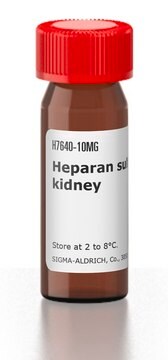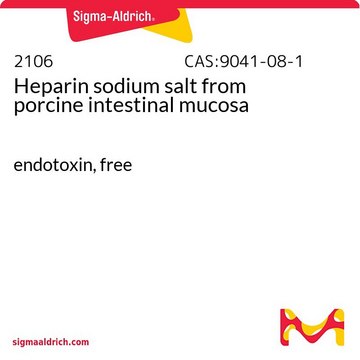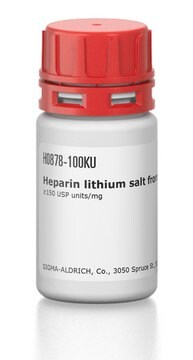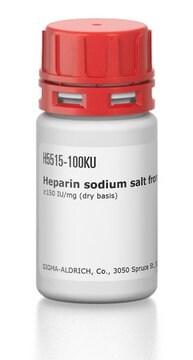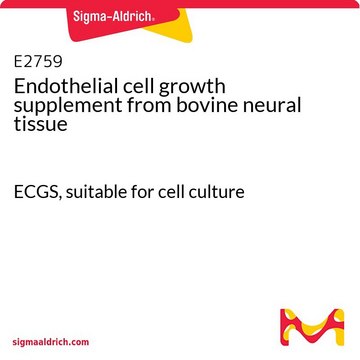H3149
Heparin sodium salt from porcine intestinal mucosa
Grade I-A, ≥180 USP units/mg, powder, BioReagent, suitable for cell culture
Sign Into View Organizational & Contract Pricing
All Photos(8)
About This Item
Recommended Products
biological source
Porcine intestinal mucosa
Quality Level
type
Grade I-A
product line
BioReagent
form
powder
specific activity
≥180 USP units/mg
technique(s)
analytical sample preparation: suitable
cell culture | mammalian: suitable
color
beige
solubility
H2O: 50 mg/mL
application(s)
cell analysis
diagnostic assay manufacturing
life science and biopharma
sample preparation
Looking for similar products? Visit Product Comparison Guide
General description
Heparin is mainly responsible for the delay in the coagulation of blood. It enhances the antithrombin-mediated inactivation of proteases in the coagulation pathway.
Heparin sodium, a sulfated polysaccharide from the glycosaminoglycan family, plays a vital role in cell culture, cancer biology, and drug discovery research. Its impact on protein and cell interactions makes it valuable for studying molecular and cellular processes, tumor modeling, exploring binding interactions, and as a cell culture supplement to support cell viability.
Application
- Heparin sodium salt from porcine intestinal mucosa has been used in sLRP (soluble circulating low density lipoprotein receptor-related protein-1) purification from human plasma.
- It has been used as a supplement in M199 medium for culturing of human umbilical vein endothelial cells.
- It has been used as an anticoagulant agent during isolation of blood.
Features and Benefits
- High-purity compound suitable for a wide variety of research applications
Other Notes
For additional information on our range of Biochemicals, please complete this form.
To gain a comprehensive understanding of our extensive range of Polysaccharides for your research, we encourage you to visit our Carbohydrates Category page.
comparable product
Product No.
Description
Pricing
Storage Class Code
11 - Combustible Solids
WGK
WGK 2
Flash Point(F)
Not applicable
Flash Point(C)
Not applicable
Personal Protective Equipment
dust mask type N95 (US), Eyeshields, Gloves
Choose from one of the most recent versions:
Already Own This Product?
Find documentation for the products that you have recently purchased in the Document Library.
Customers Also Viewed
Ko-Hsun Liao et al.
PloS one, 12(6), e0179758-e0179758 (2017-06-24)
Tissue angiogenesis is intimately regulated during embryogenesis and postnatal development. Defected angiogenesis contributes to aberrant development and is the main complication associated with ischemia-related diseases. We previously identified the increased expression of RUNX1T1 in umbilical cord blood-derived endothelial colony-forming cells
Factor Xa and thrombin, but not factor VIIa, elicit specific cellular responses in dermal fibroblasts.
Bachli EB et al.
Journal of Thrombosis and Haemostasis, 1, 1935-1935 (2003)
Cristina Di Primio et al.
Frontiers in molecular neuroscience, 10, 210-210 (2017-07-18)
The microtubule (MT)-associated protein Tau is a natively unfolded protein, involved in a number of neurodegenerative disorders, collectively called tauopathies, aggregating in neurofibrillary tangles (NFT). It is an open question how the conversion from a MT bound molecule to an
Effects of T-lymphocyte depletion on muscle fibrosis in the mdx mouse.
Morrison J, et al.
The American Journal of Pathology, 166, 1701-1701 (2005)
Structure of the antithrombin-binding site in heparin.
Lindahl U et al.
Proceedings of the National Academy of Sciences of the USA, 76, 3198-3202 (1979)
Our team of scientists has experience in all areas of research including Life Science, Material Science, Chemical Synthesis, Chromatography, Analytical and many others.
Contact Technical Service

